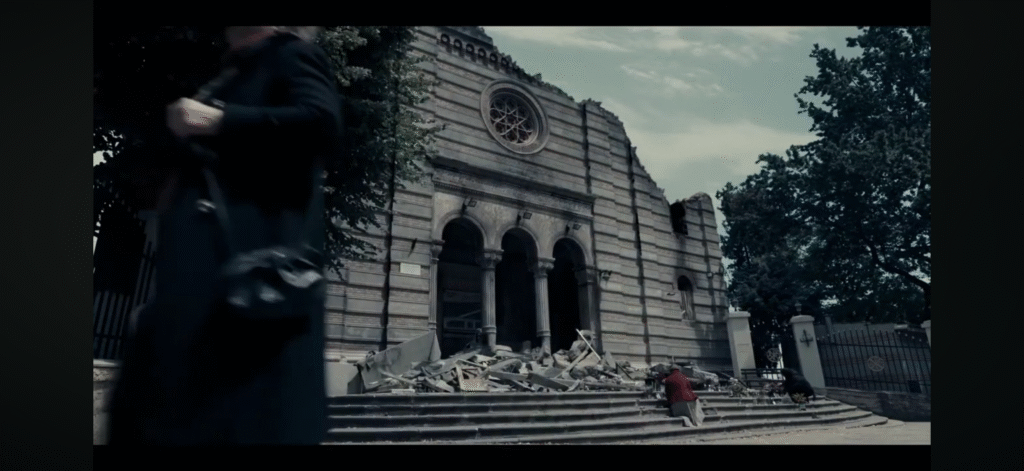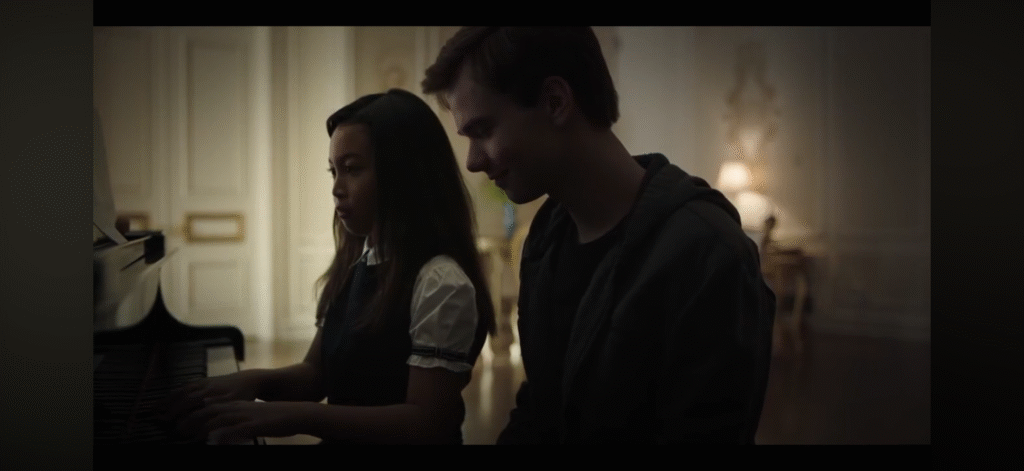Childhood gives Nikolai a single, unshakable constant: the family piano. In a cramped apartment where time is counted in bread lines and whispers, that instrument is his shelter. He learns every creak of the bench, every splinter in the keys, until muscle memory becomes muscle mercy. Years later, when bullets and blame force him to run, his body chooses for him—snapping reality like a thread and throwing him back to that battered piano. Safety isn’t a place; it’s a chord progression.
War teaches the rest. Rations arrive like rumors, never enough and always late. Nikolai’s family measures meals the way musicians count beats—carefully, anxiously, together. Hunger binds them even as the sky breaks open. They keep the windows taped and the lights low. They talk in half-sentences. They wait. And in the middle of that waiting, there is music.
The imagination becomes their weapon. When the church is shelled, Nikolai coaxes his little brother to the keys. Play, he says. Louder. As stone dust drifts like snow and the world fractures, the boy climbs the scales, building a ladder no explosion can reach. Bombardment turns into accompaniment; the sanctuary, however broken, remembers how to echo. In those minutes, numbness masquerades as grace. Anyone who has felt that strange calm at the edge of death knows it: the mind steps outside the blast radius and watches, still and bright, as if blessed.
In this crucible the power awakens. Faced with a leap that would end him—a rooftop too far, a fall too final—Nikolai doesn’t land. He vanishes, mid-gravity, and reappears on the piano bench, heart sprinting, fingers already reaching for scales. His survival mechanism is a homing signal to his most intimate refuge. It’s not triumph; it’s compulsion. The body says: live. The body also says: go back.
The series threads a rough parable through this: temptation without revelation. “Throw yourself off the wall” the old story dares. “God will give his angels the command to safe you.” Do not test Jehovah, your God.
Distance, meanwhile, grows inside the living. Wesley—the friend on the far side of a sealed border—writes letters to a family that may never answer. He mails hope anyway, the way people breathe into paper bags: not because it fixes anything, but because it keeps the heart from bolting. His counsel to Nikolai is disarmingly simple: when people do not understand, they make stories. Scripture, science, gossip, even grief—different dialects of the same survival language. The goldfish thinks the bowl is the world because the bowl is the world it knows. So get out of the bowl, Wesley says. Look again. Of course, leaving one small world only delivers you to a larger one with sharper edges.

Back in the ruins, Nikolai’s uncle refuses to believe the evidence of his eyes. The boy he loved died in that church; therefore, the man who blinks in and out of rooms must be a ghost—caught between heaven and earth, condemned to appear and vanish, never to belong. Teleportation looks like haunting from the outside. Sometimes it feels like haunting from the inside, too.
And then there’s Elaine—the CEO’s daughter with a childhood scored, like Nikolai’s, in eighth notes and minor keys. Piano is their truce and their code. They don’t have to explain the way a single phrase can swallow a day. They already know about rooms that go quiet when you play right, about the soft tyranny of metronomes and the way practice can smother panic. Music is how they say: I survived.
Wesley, with the innocent swagger of the impossible, wonders if they could catch The Ramones in Toronto and The Clash in Tokyo on the same day. With teleportation, certainly. Without it, there are planes and livestreams and the tired romance of jet lag—proof that desire has always been faster than geography. The point isn’t convenience; it’s appetite. Teleportation doesn’t satisfy longing; it only exposes how bottomless longing is.
Control arrives the way it always does in this story: through refusal. Nikolai clenches a fist, feels the old reflex surge, and chooses not to run. He returns—on foot, in time—to the bombed church, the place where his family’s thread was cut. He sits where the pews split and the dust still tastes like mortar. He does not teleport out. He lets the past do its worst and refuses to disappear. Only then does the power become a tool instead of a trap. The show pairs his breakthrough with Henry’s: she, too, had to step back into the truck where Clay hurt her and live through it without escaping. There is no shortcut around the wound; there is only the long way through.
Freedom has a price, and both of them pay it. Nikolai trades the safety of “home” for the open hazard of choice—severing his last tie to family in the ugliest possible way. Henry gives up the protective circle of her mother, Cleo, and the illusion that closeness guarantees safety. Independence isn’t a warm blanket in this world. It’s a winter road at midnight—clear, honest, and merciless.
Canada offers a brief detour, a colder bowl with clearer water. Nikolai goes to see Wesley’s father, hoping proximity to the dead might translate into guidance for the living. He intends to leave. The door is right there. But a young girl—Elaine—sits down at the piano and, with the unthinking confidence of the talented, finds the same notes his little brother once found under fire. That sound is a hand on his shoulder. It says: Stay, at least for now. Not because it’s safer, but because it’s true.
By the end of “The Moroi,” Nikolai is no longer fleeing to the piano; he’s carrying it inside him. The sanctuary traveled. The anchor unhooked and became movement itself. He can go anywhere now, which is not the same thing as being free—but it’s closer than he was. And when the moment comes to jump, he will know the difference between testing fate and trusting himself, between stories that numb and stories that guide, between vanishing and arriving.
